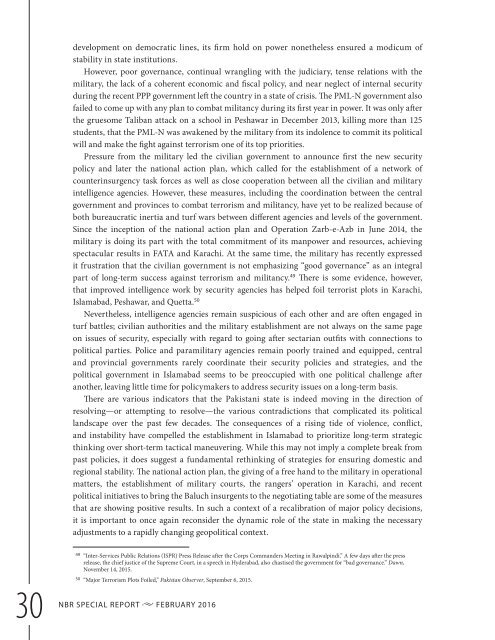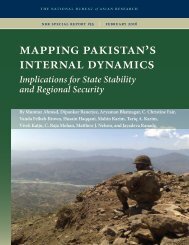pakistan’s
SR55_Mapping_Pakistan_February2016
SR55_Mapping_Pakistan_February2016
You also want an ePaper? Increase the reach of your titles
YUMPU automatically turns print PDFs into web optimized ePapers that Google loves.
development on democratic lines, its firm hold on power nonetheless ensured a modicum of<br />
stability in state institutions.<br />
However, poor governance, continual wrangling with the judiciary, tense relations with the<br />
military, the lack of a coherent economic and fiscal policy, and near neglect of internal security<br />
during the recent PPP government let the country in a state of crisis. The PML-N government also<br />
failed to come up with any plan to combat militancy during its first year in power. It was only ater<br />
the gruesome Taliban attack on a school in Peshawar in December 2013, killing more than 125<br />
students, that the PML-N was awakened by the military from its indolence to commit its political<br />
will and make the fight against terrorism one of its top priorities.<br />
Pressure from the military led the civilian government to announce first the new security<br />
policy and later the national action plan, which called for the establishment of a network of<br />
counterinsurgency task forces as well as close cooperation between all the civilian and military<br />
intelligence agencies. However, these measures, including the coordination between the central<br />
government and provinces to combat terrorism and militancy, have yet to be realized because of<br />
both bureaucratic inertia and turf wars between different agencies and levels of the government.<br />
Since the inception of the national action plan and Operation Zarb-e-Azb in June 2014, the<br />
military is doing its part with the total commitment of its manpower and resources, achieving<br />
spectacular results in FATA and Karachi. At the same time, the military has recently expressed<br />
it frustration that the civilian government is not emphasizing “good governance” as an integral<br />
part of long-term success against terrorism and militancy. 49 There is some evidence, however,<br />
that improved intelligence work by security agencies has helped foil terrorist plots in Karachi,<br />
Islamabad, Peshawar, and Quetta. 50<br />
Nevertheless, intelligence agencies remain suspicious of each other and are oten engaged in<br />
turf battles; civilian authorities and the military establishment are not always on the same page<br />
on issues of security, especially with regard to going ater sectarian outfits with connections to<br />
political parties. Police and paramilitary agencies remain poorly trained and equipped, central<br />
and provincial governments rarely coordinate their security policies and strategies, and the<br />
political government in Islamabad seems to be preoccupied with one political challenge ater<br />
another, leaving little time for policymakers to address security issues on a long-term basis.<br />
There are various indicators that the Pakistani state is indeed moving in the direction of<br />
resolving—or attempting to resolve—the various contradictions that complicated its political<br />
landscape over the past few decades. The consequences of a rising tide of violence, conflict,<br />
and instability have compelled the establishment in Islamabad to prioritize long-term strategic<br />
thinking over short-term tactical maneuvering. While this may not imply a complete break from<br />
past policies, it does suggest a fundamental rethinking of strategies for ensuring domestic and<br />
regional stability. The national action plan, the giving of a free hand to the military in operational<br />
matters, the establishment of military courts, the rangers’ operation in Karachi, and recent<br />
political initiatives to bring the Baluch insurgents to the negotiating table are some of the measures<br />
that are showing positive results. In such a context of a recalibration of major policy decisions,<br />
it is important to once again reconsider the dynamic role of the state in making the necessary<br />
adjustments to a rapidly changing geopolitical context.<br />
30<br />
NBR<br />
49 “Inter-Services Public Relations (ISPR) Press Release ater the Corps Commanders Meeting in Rawalpindi.” A few days ater the press<br />
release, the chief justice of the Supreme Court, in a speech in Hyderabad, also chastised the government for “bad governance.” Dawn,<br />
November 14, 2015.<br />
50 “Major Terrorism Plots Foiled,” Pakistan Observer, September 6, 2015.<br />
SPECIAL REPORT u FEBRUARY 2016



